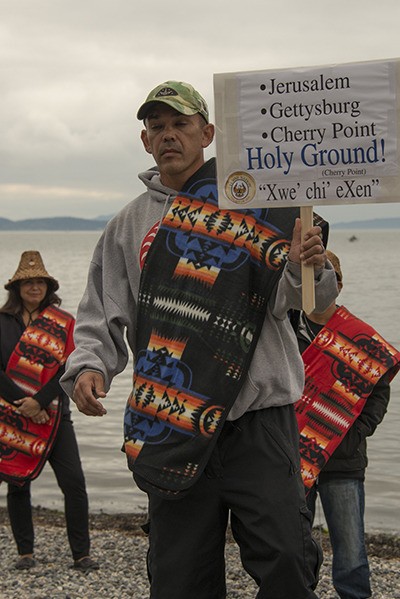In late July the Lummi Nation governing Council declared its “unconditional and unequivocal opposition to the proposed Gateway Pacific Terminal” now being planned for Cherry Point on the Whatcom County shoreline facing Orcas Island.
On August 31 two nationally prominent Lummi leaders, Jeremiah Julius and Jewell James and several other Lummi members, will visit Eastsound to discuss this decision and plans for a totem pole journey aimed at unifying Native American tribes in opposition to the planned coal terminals.
The proposed terminal would be located just a few miles northwest of Lummi Nation lands and directly amidst the site of the ancient village and burial grounds they call Xwe’chi’eXen, which is listed in the Washington state register of historic places. Preparations for the terminal have already disturbed this site.
Fugitive coal dust from storage piles and ship loading would pollute the waters around Cherry Point, an important herring spawning grounds and rich crab fishery. High winds could also carry this dust downwind to the Lummi lands.
The Lummi and affiliated tribes originally fished throughout the San Juan Islands and surrounding Salish Sea. In fact, they had fishing villages on Madrona Point, which was returned to Lummi ownership in 1990. They are our neighbors.

After thoroughly studying the terminal proposal, Lummi leaders concluded that they could not countenance the major adverse impacts it would inflict upon their Schelangen, or “way of life,” which stresses the connectedness of all things and planning for the future of the next seven generations.
Julius and James will explain the cultural, historical and philosophical bases for the Lummi opposition, grounded in the 1855 Treaty of Point Elliott, which gave Puget Sound tribes clear rights to continue fishing in their “usual and accustomed grounds and stations.” These rights were upheld by the US Supreme Court in 1979.
James will also discuss the Kwel hoy’ (“We draw the line”) totem pole he is now carving in preparation for a 1500-mile journey through tribes, towns and cities along rail lines from Wyoming’s Powder River Basin to Xwe’chi’eXen.
Jeremiah (“Jay”) Julius is Secretary of the Lummi Nation governing Council, a fisherman, crabber, successful businessman, and father of four. He is descended from tribesmen who have fished the waters off Xwe’chi’eXen for centuries. He was recently featured in a KCTS documentary and a related PBS News Hour piece about the proposed Northwest coal terminals. Councilman Julius will discuss the need to protect the sacred lands and waters of Xwe’chi’eXen and the San Juan Islands, the aboriginal territory of the Lummi Indians.
Jewell James is Director of the Lummi Nation’s Sovereignty and Treaty Protection Office, a former Lummi Councilman and Director of the Lummi Fisheries Department, and a master carver. The subject of several acclaimed documentaries, he carved and delivered totem poles to each of the 9-11 sites to help the American Nation heal these wounds. James will talk about the vision and purpose of the Kwel hoy’ totem pole he is carving.
The talks will begin at 5 pm on Saturday, August 31, in the Episcopal Parish Hall on Main Street in Eastsound, cosponsored by Friends of the San Juans and the Orcas NO COALition. Admission is free but donations to the Kwel hoy’ totem pole journey will be gratefully appreciated.
The PBS News Hour program featuring Jeremiah Julius can be viewed online at:
http://www.pbs.org/newshour/bb/environment/july-dec13/coal_08-02.html
More about Jewell James as artist, ecologist, and Indian leader can be found at:
http://nlmtotem.wordpress.com/2011/06/28/jewell-james-artist-profile


